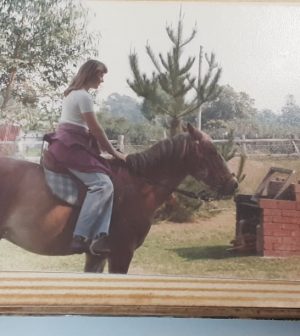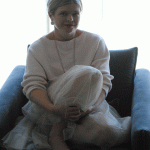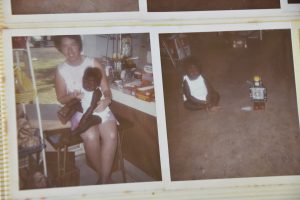- Finding Unshakable Power in a World That Wants to Pull Us ApartPosted 5 months ago
- What could a Donald Trump presidency mean for abortion rights?Posted 5 months ago
- Financial Empowerment: The Game-Changer for Women in Relationships and BeyondPosted 6 months ago
- Mental Health and Wellbeing Tips During and After PregnancyPosted 6 months ago
- Fall Renewal: Step outside your Comfort Zone & Experience Vibrant ChangePosted 6 months ago
- Women Entrepreneurs Need Support SystemsPosted 6 months ago
We Untamed Daughters

By Amanda Racanovic
My mother was a horsewoman.
Half Hungarian gypsy, half white Aboriginal – the daughter of a German emigrant who unearthed herself in the island wilderness, baking Bavarian cakes and sewing A-line polka dot dresses, stranded with three children in the Golf of Carpentaria: stronger than Tokaji, fiercer than the heat.
I remember how my mother would stand on one foot and gaze up at the sky before getting back to the business at hand of keeping house: cleaning and cooking and raising two daughters. Head down, heart strong, mouth closed – a thin, compressed line, concentrating or swallowing her feelings, or perhaps both. She had that grim determination that the migrants passed down to their children after the war. They wore their stoicism like protective amulets, safeguarding them from unseen futures, their post-war phalanx.
She started out mucking out stables, shovelling horse shit for money. Mornings and weekends she’d escape to the stables, inhaling the earth-and-sweat smell of horse before sinking herself into manure, doggedly digging her way to freedom. I imagined her daydreaming about riding back out into the outback, back to the tribes to exorcise herself of all those feelings that tied herself to a person who she didn’t want to be; the darkest and smallest of three children, the one most shackled to guilt. ‘I am back, my sisters,’ I’d hear her say, finding her way to them, and they would dance and scream into the four winds and eat and talk and feel the dirt beneath them cushioning them, and know that they had all they’d ever need in this one moment of honest, open love, and let it spill up and out into the sky to become star light.
Pictured: my grandmother in Groote Eylandt
‘Middy was my first horse.’ Tenderness stole into her eyes. ‘Gentle as a lamb. Fifteen hands, dapple grey. She had such doleful eyes.’ They would trot off together, quietly melting into the bush at first light and returning at twilight, the vestiges of the sun having softened the sting of loneliness, another heartbeat echoing her own. ‘And then there was Comanche, my quarter draft horse. He was such a beautiful stallion. Chestnut – the shiniest coat. I bought him for one-hundred-and-fifty dollars from Julie Jones next door.’ It was Comanche who urged her onwards to make her way to the bushmen and the jillaroos and the ranches, to vast and empty open spaces, spaces where dreamers could dream undisturbed. Where limitlessness beauty and adventure beckoned. I imagined her setting off for some country farm and finding herself amongst salt-of-the-earth people like her Hungarian relatives; people who understood her, who felt her. She’d fall into bed and fall asleep with her face browned by the sun but her soul light, golden and shining.
When we arrive with our girls she smiles and her sun-spotted face is full of a familiar hearty warmth. I bring an empty notebook and my laptop and our new pet rabbit, snowy-white and flop-eared, and we let it run about outside. My mother laughs at its leaps and sprints, feeling the same kind of feeling that I do at seeing something free and alive, and delighting in it. I follow it about, and she follows me, and a light mist of rain falls covering the mountain in a veil of cloud.
I want to tell her that I’ve done it; that I’ve chased my dream and made it come true, that I’ve found my tribe, and that I’ll buy her a horse. ‘I did it!’ I want to cry. ‘Finally! We’re free! We can chase sunsets and feel the ancients in the stars twinkling over us, knowing they were guiding us all along. Choose whichever horse you want, and we’ll go.’
But my children call for us and she turns away, her temples greyed, her arm newly casted from a fall. Shattered wrist and humorous – they had to put a steel rod in it to fix her again. She had been out walking, dancing in the wind, and fell over.
‘I’d better put dinner on,’ she says, retreating indoors. I watch her walk slowly away and feel my head heavy with words, my heart full of sadness and pain. I want to tell her that in choosing me, she didn’t lose her spirit, and that she will find it again one day in the rustling leaves of a blossoming gum and the rich ochre earth. That her free and untamed spirit which burned in her burns on in me. But as the years drag by, I feel the spirit fading, too. The pages of my notebook are scribbled over by my own untamed children, and I lose myself in dreaming; the daughter of a half Hungarian gypsy, half white Aboriginal. Often I catch myself gazing up at the sky, watching the clouds drifting by before getting back to the housework and the children, going inside to get the next meal ready.
Softened, spent, I follow my mother inside, the rabbit in my arms, her little run done for the day. The light of the house leads me in, and I take one last look up to see the full moon – haloed in light, golden and shining.
********
 Amanda Racanovic lives in Melbourne, Australia, with her two daughters and husband. She works with women and mothers of young children and is passionate about self-care and women’s wellbeing in nurturing and raising children mindfully.
Amanda Racanovic lives in Melbourne, Australia, with her two daughters and husband. She works with women and mothers of young children and is passionate about self-care and women’s wellbeing in nurturing and raising children mindfully.
You can connect with her on Facebook here: https://www.facebook.com/amandaracanovic.







